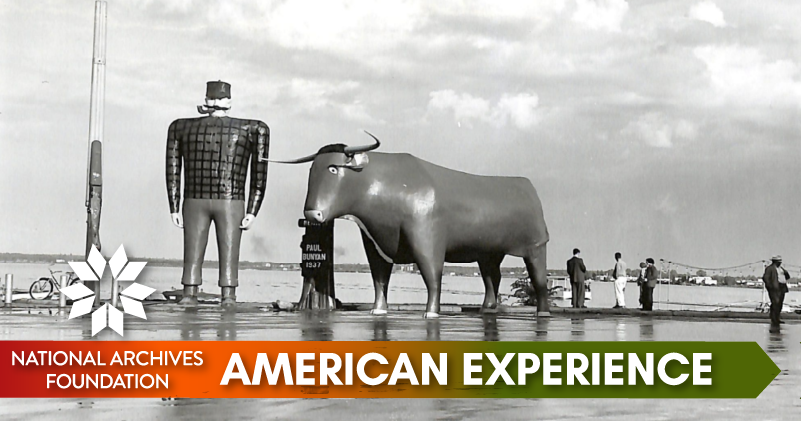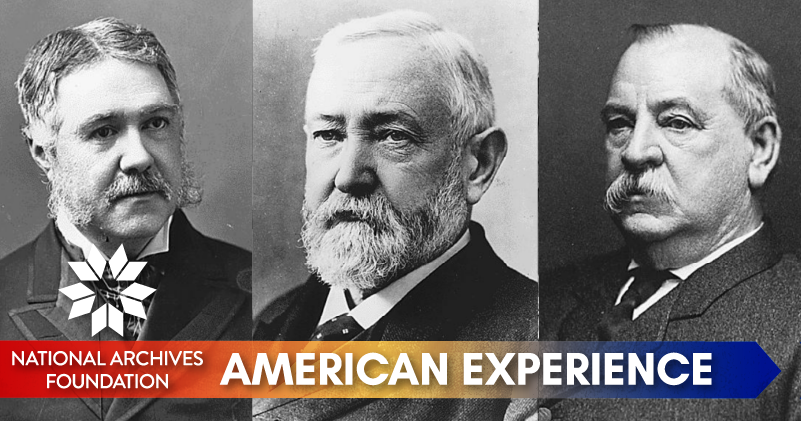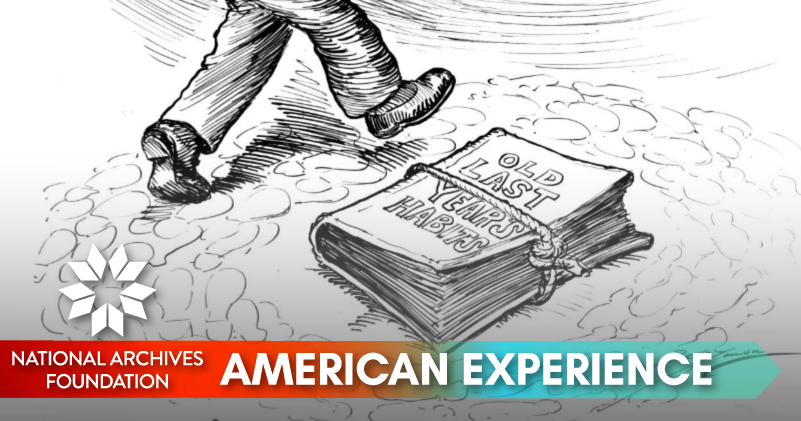Poet? Don’t We Know It!

In 1996, the American Academy of Poets declared April National Poetry Month. Inspired by the success of Black History Month and Women’s History Month, the academy wanted to highlight the importance of poetry in American culture. In honor of this literary celebration, we wanted to showcase some of the verse-related entries in the National Archives.
President John F. Kennedy was the first President to include a poet at his inauguration. Poet Robert Frost had originally intended to read a poem titled “Dedication,” which he had written specifically for the momentous event, but when he stepped up to the podium, the glare of the sun was so bad that he couldn’t read the paper. Instead, the poet recited his poem “The Gift Outright” from memory. President Kennedy was such a fan of Frost’s that he awarded him the prestigious Congressional Gold Medal the following year.

JFK and Robert Frost
Source: JFK Library
It was not until 1993 under President Bill Clinton that a poem was heard again at an inauguration, when Clinton asked poet Maya Angelou to recite one of her poems. She chose “On the Pulse of Morning.” A photo of the event can be seen below.

Maya Angelou at Clinton Inauguration
National Archives Identifier: 183373896
Sometimes presidents receive poems as responses to their actions, such as this poem Ms. Pauli Murray sent to President Franklin Delano Roosevelt in 1943. When notified about intense racial unrest in Detroit and other American cities, FDR responded by writing, “I share your feeling that the recent outbreaks of violence in widely spread parts of the country endanger our national unity and comfort our enemies. I am sure that every true American regrets this.” After reading FDR’s response in a newspaper, Pauli Murray wrote the poem “Mr. Roosevelt Regrets” and sent it to First Lady Eleanor Roosevelt.
Mrs. Roosevelt actually did write back: “Dear Miss Murray: I have your poem dated July 21st. I am sorry but I understand. Very sincerely yours, Eleanor Roosevelt.”” You can see what is most likely her handwriting in the reply and quick sign-off at the top of the paper. It would have been given to an aide to type and send the official copy. The official reply is also in the National Archives.

FDR poem
National Archives Identifier: 311315473
Many presidents had a fond appreciation for poetry and looked to this art form for speeches, inspiration, and even daily life. President Woodrow Wilson was so fond of limericks that he often quoted them in his speeches. In 1919, he publicly apologized for crashing a Bastille Day party at the French Embassy by writing
There was a young man so benighted
He never knew when he was slighted.
He went to a party
And ate just as hearty
As if he had been really invited.
Perhaps he was just very excited by his recent trip to France post-World War I, as shown in this portrait taken in Seine on May 21, 1919, only a few months before his social faux pas and poetic apology.

Wilson in 1919
National Archives Identifier: 313163531
Harry Truman carried a copy of Lord Tennyson’s poem “Locksley Hall” in his wallet. When it wore out, he made a fresh copy. He estimated he must have written the poem out over 20 times.
In the Truman Presidential Library, there is an illuminated copy of Rudyard Kipling’s poem “If.” It is unclear whether this was President Truman’s personal edition of the poem or what its exact use was. However, if you look closely at the bottom, you will see the word “man” crossed out and replaced with “Battery Commander.” President Truman was a Battery Commander in World War I, so it is possible that this was Truman’s personal copy with an inside joke written in.

Illuminated Copy Of the Poem “If-” By Rudyard Kipling
National Archives Identifier: 75439791
Many presidents loved the poem “If.” Gerald Ford discusses its importance to him in his autobiography. He used the poem as a way to control his hot temper as a child, a technique taught to him by his mother.
President Ronald Reagan also claimed “If” was his favorite poem and spoke of Rudyard Kipling in speeches. In one of his last public speeches, given at DAR Constitution Hall on December, 13 1988, Reagan said, “And now as I prepare to lay down the mantle of office, as I see how far we’ve come and the transformations we’ve wrought, and I know who will take my place, I cannot help believe that what Kipling said of another time and place is true today for America: ‘We are at the opening verse of the opening page of the chapter of endless possibilities.’”
President Ronald Reagan’s Address to Administration Officials on Domestic Policy at Constitution Hall, Washington, DC
(35 minutes 45 seconds)
Source: National Archives Identifier: 38995419
Happy National Poetry Month! In celebration, we have included three Presidential favorite poems below.
The Gift Outright
by Robert Frost
The land was ours before we were the land’s.
She was our land more than a hundred years
Before we were her people. She was ours
In Massachusetts, in Virginia,
But we were England’s, still colonials,
Possessing what we still were unpossessed by,
Possessed by what we now no more possessed.
Something we were withholding made us weak
Until we found out that it was ourselves
We were withholding from our land of living,
And forthwith found salvation in surrender.
Such as we were we gave ourselves outright
(The deed of gift was many deeds of war)
To the land vaguely realizing westward,
But still unstoried, artless, unenhanced,
Such as she was, such as she would become.
On the Pulse of Morning
by Maya Angelou
A Rock, A River, A Tree
Hosts to species long since departed,
Marked the mastodon,
The dinosaur, who left dried tokens
Of their sojourn here
On our planet floor,
Any broad alarm of their hastening doom
Is lost in the gloom of dust and ages.
But today, the Rock cries out to us, clearly, forcefully,
Come, you may stand upon my
Back and face your distant destiny,
But seek no haven in my shadow.
I will give you no hiding place down here.
You, created only a little lower than
The angels, have crouched too long in
The bruising darkness
Have lain too long
Face down in ignorance.
Your mouths spilling words
Armed for slaughter.
The Rock cries out to us today, you may stand upon me,
But do not hide your face.
Across the wall of the world,
A River sings a beautiful song. It says,
Come, rest here by my side.
Each of you, a bordered country,
Delicate and strangely made proud,
Yet thrusting perpetually under siege.
Your armed struggles for profit
Have left collars of waste upon
My shore, currents of debris upon my breast.
Yet today I call you to my riverside,
If you will study war no more. Come,
Clad in peace, and I will sing the songs
The Creator gave to me when I and the
Tree and the rock were one.
Before cynicism was a bloody sear across your
Brow and when you yet knew you still
Knew nothing.
The River sang and sings on.
There is a true yearning to respond to
The singing River and the wise Rock.
So say the Asian, the Hispanic, the Jew
The African, the Native American, the Sioux,
The Catholic, the Muslim, the French, the Greek
The Irish, the Rabbi, the Priest, the Sheik,
The Gay, the Straight, the Preacher,
The privileged, the homeless, the Teacher.
They hear. They all hear
The speaking of the Tree.
They hear the first and last of every Tree
Speak to humankind today. Come to me, here beside the River.
Plant yourself beside the River.
Each of you, descendant of some passed
On traveller, has been paid for.
You, who gave me my first name, you,
Pawnee, Apache, Seneca, you
Cherokee Nation, who rested with me, then
Forced on bloody feet,
Left me to the employment of
Other seekers—desperate for gain,
Starving for gold.
You, the Turk, the Arab, the Swede, the German, the Eskimo, the Scot,
You the Ashanti, the Yoruba, the Kru, bought,
Sold, stolen, arriving on the nightmare
Praying for a dream.
Here, root yourselves beside me.
I am that Tree planted by the River,
Which will not be moved.
I, the Rock, I the River, I the Tree
I am yours—your passages have been paid.
Lift up your faces, you have a piercing need
For this bright morning dawning for you.
History, despite its wrenching pain
Cannot be unlived, but if faced
With courage, need not be lived again.
Lift up your eyes upon
This day breaking for you.
Give birth again
To the dream.
Women, children, men,
Take it into the palms of your hands,
Mold it into the shape of your most
Private need. Sculpt it into
The image of your most public self.
Lift up your hearts
Each new hour holds new chances
For a new beginning.
Do not be wedded forever
To fear, yoked eternally
To brutishness.
The horizon leans forward,
Offering you space to place new steps of change.
Here, on the pulse of this fine day
You may have the courage
To look up and out and upon me, the
Rock, the River, the Tree, your country.
No less to Midas than the mendicant.
No less to you now than the mastodon then.
Here, on the pulse of this new day
You may have the grace to look up and out
And into your sister’s eyes, and into
Your brother’s face, your country
And say simply
Very simply
With hope—
Good morning.
by Rudyard Kipling
Are losing theirs and blaming it on you,
If you can trust yourself when all men doubt you,
But make allowance for their doubting too;
If you can wait and not be tired by waiting,
Or being lied about, don’t deal in lies,
Or being hated, don’t give way to hating,
And yet don’t look too good, nor talk too wise:
If you can think—and not make thoughts your aim;
If you can meet with Triumph and Disaster
And treat those two impostors just the same;
If you can bear to hear the truth you’ve spoken
Twisted by knaves to make a trap for fools,
Or watch the things you gave your life to, broken,
And stoop and build ’em up with worn-out tools:
And risk it on one turn of pitch-and-toss,
And lose, and start again at your beginnings
And never breathe a word about your loss;
If you can force your heart and nerve and sinew
To serve your turn long after they are gone,
And so hold on when there is nothing in you
Except the Will which says to them: ‘Hold on!’
Or walk with Kings—nor lose the common touch,
If neither foes nor loving friends can hurt you,
If all men count with you, but none too much;
If you can fill the unforgiving minute
With sixty seconds’ worth of distance run,
Yours is the Earth and everything that’s in it,
And—which is more—you’ll be a Man, my son!




